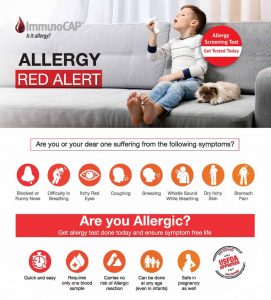How do you find out if you are Allergic to something?

What is Allergy?
To test for allergy, it is very important to understand what is an allergy or an allergic reaction.
Allergies are a type of hypersensitive reaction response – a situation where the body’s immune system overreacts and hence causes discomfort, damage, and even death in some instances. The allergic reaction is a response produced within 5 – 10 mins of encountering a unique allergen – any substance that exists in the outer world and provokes an allergic reaction but is otherwise not necessarily dangerous. Common allergens include pollen, residence dirt mite faeces, diverse foods, and so on. Atopy is the period given to the genetic predisposition to have allergic reactions.
Hypersensitive reactions are due to the interaction of the allergen with a chemical called IgE. It is located on the surface of individual cells in our immune system known as mast cells, even though afterwards different chemical compounds can also be involved. IgE is produced with the aid of plasma cells – another mobile inside the immune gadget – on the primary stumble upon with the allergen. The allergen, while it comes into contact with IgE on mast cells, reasons the mast mobile to launch different chemical mediators, which cause the symptoms of allergies.
In this blog, we will mainly focus on the science behind allergic reactions, how to test for allergy and will also in brief cover certain types of hypersensitivity, prognosis, and treatment. Greater statistics about specific kinds of allergic reactions, diagnostic exams for allergic reactions, and treatment alternatives may be found in their respective personal articles.
Sensitivity or Allergy
Sometimes people misunderstand the difference between allergy and sensitivity. Although the terms allergy and sensitivity are regularly used interchangeably, some sensitivities aren’t true allergies. This suggests that they do no longer intrude together with your lifestyles or should not be addressed. But, allergies occur when the immune device overreacts to environmental triggers, inflicting tissue inflammation, organ dysfunction and an array of other symptoms. Sensitivities may consist of genuine allergies, reactions that don’t have an effect on the immune system, and reactions for which the cause has but to be determined.
Both allergies and sensitivities can invoke an immune system reaction, but allergies normally cause immediate antibody reactions inside the bloodstream while sensitivities trigger slower responses inside cells. Every other manner to test for allergies may be apparent and easy to track, consisting of sneezing or wheezing when you walk thru a freshly mown lawn, sensitivities to meals and chemical substances may be greater subtle and continual.
To test whether a person has allergy or sensitivity, it is best to consult a doctor instead of inferring some not so trusted ways.
Symptoms of Allergy
Signs and symptoms which usually prompt an allergist to carry out testing consist of:
- Respiratory: itchy eyes, nostril or throat; nasal congestion, runny nose, watery eyes, chest congestion, cough or wheezing
- Skin: itchiness or eczema
- Stomach: vomiting or cramping and diarrhoea consistently after ingesting positive foods
- Excessive reactions to stinging insect stings (other than swelling at the site of the sting)
- Anaphylaxis (said an-a-fi-LAK-sis): a severe allergic reaction that affects many parts of the body at the same time. It is essential that carrying out an allergy test is directed with the help of a healthcare expert with enough allergic reaction/immunology education and brought on by way of his clinical records.
Types of Allergy
To understand the correct test for allergy one must understand what type of allergy he/she has. Some of the most common allergy types are as following:
Food Allergy: Food allergy occurs when your body overreacts to a food item or a substance present in the food. While any food can trigger allergic reactions but few food items are the reason for about 90 % of all the reactions; milk, peanuts, tree nuts, shellfish, wheat, soy, eggs.
Skin Allergy: An allergy in the skin can be seen in the form of bumps, itching, and redness. Some common types of skin allergies are atopic dermatitis, hives, and contact dermatitis and latex allergy.
Dust Allergy: Dust allergy leads to breathing problems such as wheezing, coughing, tightness in the chest and can go to the extent of asthma.
Drug Allergy: If you develop rashes, bumps or find difficulty in breathing after taking certain medicines, a person can have a drug allergy. As with other types of allergic reactions, these symptoms can occur when your body’s immune system becomes sensitised to a foreign substance in the medicine, perceiving it as a foreign invader and hence releases chemicals to defend against it.
Seasonal Allergies: In case you sneeze and cough or your nostril and eyes itch and are runny at some point of certain times of the year, you could have seasonal allergies. Seasonal allergic reactions, like other allergic reactions, increase when the body’s immune system becomes sensitized and overreacts to something within the surroundings.
There are many more types but the above listed are quite common ones.
Types of Allergy Tests
Different allergens trouble different people, so your allergist will decide which allergy testing type is required for you. Irrespective of the kind of allergy test, an allergist will first perform a physical exam and enquire about your symptoms to determine if any test is required or not and if required then what type of allergy test will be best suited. Different allergy testing type has different allergy testing procedure. Some of them the common allergy testing types are as follows:
IgE skin exams: This form of allergy testing procedure is the most common and is especially painless. A very small amount of certain allergens is placed into your pores and skin with the aid of creating a small indentation or “prick” at the surface of your skin.
If you have allergies, only a little swelling that appears and appears like a mosquito chunk will arise where the allergen(s) in particular was delivered. In case you are allergic to ragweed pollen but not to cats, only the ragweed allergen will cause a touch swelling or itching. The spot wherein the cat allergen was applied will continue to be normal.
You don’t have to wait long to discover what’s triggering your allergies. Reactions occur within about 20 mins. And you normally won’t have other signs except the small hives where the assessments had been completed, which go away in around half an hour. If your prick skin checks are negative but your medical doctor nevertheless suspects you might have allergies, more sensitive “intradermal” checks may be used wherein a small quantity of allergen is injected within the skin.
Skin tests are best executed in an allergist’s workplace to guarantee the test results are examined properly and to decrease the risk of rare side effects.
Challenge checks: In this type of allergy test a very small quantity of an allergen is inhaled or taken via mouth. Challenges are carried out generally with potential food or medicinal drug allergic reactions. It is very important that they are supervised by a physician with specialised education and experience, consisting of an allergist.
Blood assessments: This check includes drawing blood, so outcomes are not as rapid as in the case of skin exams. IgE blood assessments are normally used when skin tests probably won’t work, which include if you are taking a particular type of medications, or have a skin situation that could interfere with pores and skin testing.
Who gets allergies?
There are numerous factors which decide whether or not a person may be at risk of allergic reactions. It is likely to be an inherited feature. Research have proven that if one parent is a topic, then there’s a 25 – 40 % chance that the kid can also be a topic. If both mother and father are atopic, the chance of the kid being atopic rises to 50 – 75 %. But no particular gene which is responsible for allergies has been identified till now.
It is also believed that kids who are brought up in cleaner environments are more susceptible to different kind of allergies.
When is Allergy Testing Appropriate?
The appropriate time for an allergy test can be determined by discussing it with your doctor. It is done best when you are highly likeable to develop an allergy or already have one.
Allergy test performed by an allergist is usually safe and effective for both adults and children of all ages. The allergen extracts and vaccines used in the allergy tests must meet certain standards and requirements.
Prevention of Allergy
The intake of numerous foods in the course of pregnancy has been linked to eczema; these consist of celery, citrus fruit, raw pepper, margarine, and vegetable oil. A high intake of antioxidants, zinc, and selenium during pregnancy may help prevent allergic reactions. This is connected to a reduced chance for early life-onset asthma, wheezing, and eczema. In addition, research needs to be carried out. Probiotic dietary supplements taken during being pregnant or infancy may help to save you from atopic dermatitis. After delivery, an early introduction of strong meals and high range before week 17 ought to increase a toddler’s chance for allergic reactions. Research endorse that introduction of strong meals and avoidance of pretty allergenic meals such as peanuts in the course of the first 12 months does not help in allergy prevention.













